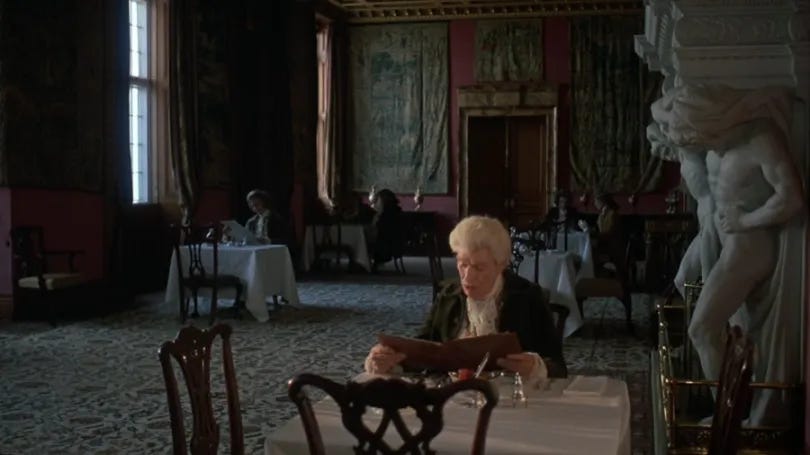On personal failure
The complex legacy of things not panning out

I feel like a failure in life, but as I get older I am realizing how little this has to do with my actual achievements or shortcomings. It has to do instead with the imagination; the sense of the better, more brilliant life, in which I have more excitement, more prestige and more fun. It is the imagination of this life, and the gap between it and my reality, which makes me feel a sense of unfulfilled potential and frustration.
When I was 20, I wrote and directed the 2003 Oxford Revue show at the Oxford Playhouse. It didn’t, for various reasons, go very well. Not all of these reasons were my fault.
Oh, boo hoo, you say – a theatre show didn’t go well when you were a student! At least you had the opportunity! Well it was, in fairness, a bit more spectacular than that. The Oxford Playhouse is a big venue, with 663 seats, and my friends, families and contemporaries were there for what was going to be an official launch of my career as a comedy writer. It ended up with about 100-150 people walking out, including many of my contemporaries, and the final scenes of the play witnessing ugly and brutal heckles from the audience. For example: ‘And you were all SHIT!’ After the show, I left Oxford briefly, and the student papers ran a story about my having done so, attention, I have to admit, that I half-wanted, half-despised.
You may have heard, but Oxford is rather a competitive environment. It is not the easiest setting in which to experience a highly public misfire at an early age.
I didn’t have the tools to deal with it, and was in a funk for many years afterwards. I wrote letters to the student newspapers and took a year out. I would say that, until I was about 25, I had a serious chip on my shoulder; the business had upset the narrative of myself I had in my head pretty fundamentally, and I lost all my Oxford friends.
Inevitably, much good came from it. It was, in the most brutal and abrupt sense, character forming. Many years later, I told an ex about it and, in her inimitable Russian way, she said ‘But this will be very good for you.’ Most of the time I feel that it was; harsh medicine is still medicinal after all. I’ve become, for one of those sensitive artistic types, you know, pretty tough, and I had lost any sense of youthful invulnerability by the age of 21. What it also left me with is a great and comprehensive empathy for failure in others.
Nonetheless, I am still, somewhat inevitably, even as it approaches two decades after the event, seeking revenge of some kind. The most obvious kind of revenge would be in the form of success – of proving all those people who so publicly humiliated myself, my actors and my work, wrong. While this may be a misguided way of looking at things, it’s also only human. And though I have had moderate successes since, nothing I’ve done quite done satisfied that need for a ‘happy ending’ – which leads me to think that perhaps failure, and perhaps especially failure at an early age, is inevitably more memorable than success.
After all, young failure, like first heartbreak, is introducing you to the concept of things not working out at all. Ironically, failure – a sense of having missed out and fallen short – has become one of the key themes of my writing and comedy although, as I sometimes joke, I think I have enough material now.
I’ve read widely on the subject of professional failure and very rarely find anything that I find useful on the topic. The advice is almost always not modelled to high achievers, and indeed often counsels people to give up on their wilder dreams entirely, and be content instead with eating some nice food and having the occasional holiday. And once you’re back from them? Well, start saving for the next pleasant break from reality.
Such acquiescence feels like death of a different kind than the stubborn chip on my shoulder my youthful catastrophe bequeathed to me – as trying and failing, I suspect, really does feel better than the failure of not having tried at all. But it still doesn’t feel great, because you remain without having attained the thing or goal you were striving for, whatever the reason for that.
But all failures are a step along the journey, right? Mmmm. The problem with this thought is that failures leading to success feel so much better when you get to the success. I see this in my marriage, which is for all its difficulties the pride and joy of my life. Meeting and marrying my spouse allowed me to contextualize all the failed trysts and sad afternoons of my earlier romantic love, the drip drip drip of airport break-ups and sudden cooling of affections that interspersed my youth. It allowed me to come to closure on all that heartbreak by seeing them as sign-posts on the way to a truly fulfilling relationship, with the proviso that that love may one day prove to be transitory too. Failure teaches you that, too.
In 2014, I unexpectedly broke up with a woman I loved very much and thought I would stay with, and remember going into a small café near Dalston Junction station and ordering a cup of decaffeinated coffee. I remember just feeling this incredible weariness of the business of being broken up with. Just three and a half years later I was getting married to someone I adored – and I would have tasted that coffee and felt that sadness a million times to get to that point.
In many ways that night at the Oxford Playhouse - and it was only one night! - still seems the most important event of my life, the exact point at which I can mark my loss of innocence. Or certainly it seemed like the event that changed me most. Even now, every minor failure I experience – crashing out in a comedy competition, an editor failing to reply to me, a producer suddenly going quiet on a pitch – revives the negative narrative in my head and offers succour to the downbeat side of my imagination. I feel that somehow around me is this embarrassing, fetid stink of failure, intermingled now with the vegetable odour of middle age.
Recently I saw a show by the comedian Matt Forde, who is basically me - he’s 39, a political comedian and from Nottingham – and looking at his beautiful shoes and hearing his perfect impressions I just started thinking, ‘Fuck’. What chance do I have? Balding, scruffy and expanding in the waist, I look like Matt Forde’s Portrait in the Attic. Literally the only thing I have on Matt Forde is that I speak better German than him, and that doesn’t seem to be hurting his career. If we were in Germany, though, Matt, how different things would be.

You can see how flawed this level of self-censure is in how I think about other people. My Dad is 82 and most of his energy now is spent on staying alive and general pottering about; nonetheless I love him and celebrate him for just being here. I am sure there are other people who feel the same about me. Maybe some of you even read this newsletter.
Yet somehow all the love and support never quite removes that internal sense of humiliation and obscurity, which is a voice not just of delusion but also a cold-eyed appraisal of the degree to which my dreams have failed to manifest; there is an objective aspect to it to, even if indulging the feelings its provokes is optional. It doesn’t help when you see people you knew at university advancing to meteoric professional success, and all the performatively celebratory social media responses in the world are weak sauce compared to the black jealous sap in our hearts.
And here’s the awful thing: Do you know what lessens this feeling? Success.
I wonder if some of this sense is due to my age cohort. I grew up Xennial generation which transitioned away from analogue media into digital as we came into maturity; I was brought up in a world where newspapers and books mattered only to come into adulthood a world where audiovisual forms dominated, and was stuck with an overly lofty sense of what a writing career meant. I can still recall the next day's newspapers piled up outside the station at King’s Cross, and how exciting the thought was to be in there.
I also wonder whether the English scepticism of intelligence and the polymath has played a role in my lack of success; England is a great country, but not the easiest place to live in as a multilingual intellectual who writes in the Jamesian tradition. It wasn’t the easiest country for Henry James to live in as a multilingual intellectual who wrote in the Jamesian tradition.
Still, for good or ill, I'm sticking to my artistic guns.

In the end, though, it seems stubbornly egotistical of me to privilege my imagination of what a good life would be like over the life I do have, which is full of the attendant richness and diffuse tribulations of any human existence. It just seems exceptionally difficult to be both ambitious and grateful for what you have. I mean, by definition, right? So I don’t say that I feel like a failure in life in order to be dramatic and self-serving – it’s just how I feel. Not always, but often.
My failure is the low-level, ambient sense of someone who has tried very hard in life to achieve certain things and not yet been able to. It’s also not the final word, and, and this is my great luck, I get to continue. I just don’t want to keep feeling this feeling of being unrealized and obscure; it feels humiliating, somehow.
You know, if I did feel differently, I’d probably have kids by now.


Many of us have felt your level of failure. At 66, I've had more than my share of setbacks and obstacles ... a career that was going nowhere at age 25, three layoffs between 1992 and 2001, a longtime marriage destroyed by drug drug addiction (and eventual overdose death of my spouse), extreme depression and premature death of my oldest son. Yet you grieve, adapt and move on ... continuing to put one foot in front of the other. because, well, it is the best and only option. "Fall down seven times, get up eight."
As I treat gently toward my good night, my goal has changed. I now value one thing more than anything else ... peace of mind. Enjoyed reading your journey. -- Jim
The joke is that I tell myself that if I had as many readers as you (probably) do I'd feel like a success. Who knows whether that's true or not - as you say, we're dealing with a persistent mental habit that may not respond to achievements in the real world - but goes to show it's all about who you compare yourself to!